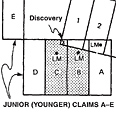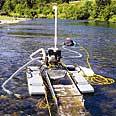All Articles
Legislative and Regulatory Update
May 2005 by Staff
• NEPA improvements coming?The House Resources Committee took baby steps toward rewriting the National Environmental Policy Act (NEPA) by creating a task force.
Lee Fuller, vice president for public policy for the Independent Petroleum Association of America, told Public Land News that oil gas companies are facing three or four levels of environmental review. NEPA documentation must currently be completed for land management plans, to support leasing, and to support BLM decisions on drilling applications. Timber companies and hardrock miners have similar complaints.
The Forest Service has taken a small step towards less NEPA documentation by allowing individual forests to opt out of writing a full Environmental Impact Statement when writing a forest plan. Environmentalists have already filed a lawsuit to try and block this change.
• Speaking of the Forest Service…
Sacramento mining attorney Richard Keith Corbin advises that his client, Mr. Jan Sticha, has been successful in his appeal regarding his Plan of Operation.
Sticha submitted his Plan of Operation back in April 1998. A Surface Use Determination was completed in November 1999. Then he waited, and waited, and waited.
In August 2004, Sticha finally received approval from District Ranger Jean Masquelier, but she added requirements and restrictions that would have made the operation unprofitable and prohibitive. These included:
•Use of the existing road denied. (Access by helicopter only.)
•Use of a powder magazine denied.
•Approval of a mill building denied.
•Approval of a maintenance shop denied.
•Continued use of watchman’s cabin and related items denied.
•An increase of the bond to $21,800.
Corbin appealed to Forest Supervisor Steven Eubanks. Through meetings with Ranger Masquelier, the parties were able to resolve the first four items, but they were unable to agree on the last two.
On April 4, 2005, Corbin received a letter from Eubanks, reversing in full the decision of Ranger Masquelier regarding the watchman’s cabin and bond increase.
Supervisor Eubanks stated that the Surface Use Determination, dated 11/05/99, was not sufficiently current to allow the Forest Service to make an informed decision. (It had been over five years since the Determination was made.)
Eubanks added, “My decision includes instructions to Ranger Masquelier to update the Surface Use Determination; to verify that the proposed Plan of Operations is still current; to then reconsider the proposed Plan of Operations, and to issue a new decision in light of the updated Surface Use Determination.”
It’s refreshing to hear that a Forest Supervisor is taking a common sense approach to a case that took much too long to resolve, and we hope any new decision reflects the same common sense.
• Murkowski proposes tax increase on miners
Alaska Governor Frank Murkowski has proposed eliminating some of the tax breaks enjoyed by oil and gas, fishing, mining and other industries operating in the state.
The bill would reverse the tax deductions that were part of the American Jobs Creation Act passed in 2004. Obviously, there is strong opposition from miners and the oil and gas industry. The bill is SB 151.
• Kensington impact statement affirmed
Alaska Regional Forester Dennis Bschor upheld the Kensington Gold Mine’s final supplemental impact statement and record of decision, denying an appeal that had been filed by the Southeast Alaska Conservation Council (SEACC).
SEACC had argued that endangered or threatened species would be harmed, and that the cumulative effects of the proposed mine and other projects were not being considered.
“All necessary findings are made and are well-founded,” wrote reviewing officer Steven Brink, who made the recommendation to uphold the decision to Bschor.
Coeur Alaska still needs to obtain the permits and licenses before moving ahead with the project.
• Rock Creek on hold, for now
The proposed Rock Creek project in Montana has been dealt a setback, though William Orchow of Revett Minerals said a recent court decision doesn’t mean the project won’t be developed eventually.
US District Judge Donald Molloy of Missoula ruled that the US Fish & Wildlife Service approved the mining plan without adequate safeguards to protect bull trout and grizzly bears.
The Sierra Club, Natural Resources Defense Council, Earthjustice and several other environmental groups banded together in filing the lawsuit to challenge the plan.
The project enjoys strong support in Troy and Libby—locals are looking forward to the creation of jobs.
Orchow said that before Molloy ruled, Revett Minerals was preparing to interview and hire people for work at the company’s operating mine near the northwestern Montana community of Troy during the next few months, so they could be trained for eventual jobs at Rock Creek.
Orchow said the company has not yet decided if they will appeal the ruling or ask for further studies.
• ESA reform update
Representative Dennis Cardoza (D-California) has introduced legislation that would delay critical habitat designations for several years after a species is listed under the Endangered Species Act (ESA).
The House Resources Committee has announced they will use Cardoza’s bill, HR 1299, as a starting point to address reform of the ESA.
Federal agencies are currently required to designate critical habitat when a species is listed as threatened or endangered, and environmentalists use this requirement as a basis for numerous lawsuits. ESA critics say there is not enough money nor time to accurately assess critical habitat under the current system. The bill would delay the designation of critical habitat until after a species recovery plan is written, which generally takes about three years.
• Desert Mineral Mining; one down, two to go for permits
Desert Mineral Mining was issued a permit by the Idaho Department of Environmental Quality for their planned construction of a gold mine about 20 miles southeast of Boise.
The company still needs to resolve water supply issues, and get a reclamation permit from the Idaho Department of Lands.
Water is hard to come by in the area, and a moratorium is in place on any new water rights in the Boise River Basin. The company has proposed several options. They could purchase water rights from local landowners, or truck water into the site. They could possibly be exempt from the water rights issue if they can use less than 2,500 gallons per day, the threshold allowed under the “Domestic Exemption” for the state. The company believes they may be able to get by with approximately 1,800 gallons per day.
• Montana smells a RAT
Montana has told the federal government to mind their own business when it comes to collecting fees from public land users.
What started out as a fee demonstration program became the Federal Lands Recreation Enhancement Act, requiring citizens to pay a fee to use public lands.
The Montana House recently passed resolution 13, demanding the repeal of the Act they have renamed the Recreation Access Tax (RAT). The measure passed 49-1.
Hal Harper, chief policy adviser to Montana Governor Brian Schweitzer, stated, “If you want to incite a revolution in this state, start charging hunters and anglers and campers a fee to access their own public lands.” Western governors have vowed to work together to get rid of the RAT.

Buying a Mining Claim: Questions to Ask
 At one time or another, many miners will look seriously at purchasing a mining claim...Usually it’s a significant financial commitment, so how do you know if you are getting a good deal?
At one time or another, many miners will look seriously at purchasing a mining claim...Usually it’s a significant financial commitment, so how do you know if you are getting a good deal?
There’s Still Gold In Oregon’s Umpqua River
 The Umpqua River, located in the heart of western Oregon, flows for several miles nearly alongside Interstate Highway Five.
The Umpqua River, located in the heart of western Oregon, flows for several miles nearly alongside Interstate Highway Five.
Hard Rock 101: Advanced Micro Blasting
 They… create negligible fumes and much less fly rock than blasting. Below are some tips on maximizing your effectiveness with these tools.
They… create negligible fumes and much less fly rock than blasting. Below are some tips on maximizing your effectiveness with these tools.
Idaho Silver Miners Come to Aid of Tsunami Victims
The Bunker Hill Mine is doing its part to help tsunami victims by sending crates of bandages impregnated with silver to Indonesia.
Working Life of Troy Mine Could Be Extended
An exploration project at the Troy Mine Complex in northwest Montana could extend the projected six or seven year life of the mine by another 5 to 10 years, officials with Revett Minerals say.
The Montanore Copper and Silver Project
 This adit will be nearly 3.5 miles long when it reaches the ore zone.
This adit will be nearly 3.5 miles long when it reaches the ore zone.
Subscription Required:
The Bawl Mill
• Our Readers Say
• Estimating Gold Values in Placer Gravels
• Lode Gold in Nicaragua
• Miners: Plan Ahead for Next Year's Taxes
• California's Original Sixteen to One Mine
• Montana Multiple Use Association Backs Miner
• Picks & Pans: Detecting Micro-Nuggets
• Diamond Search Underway in Alaska and Minnesota
• Mining Outfits Eye 50-Year Supply of Iron Ore
• Goldfield—Princess of the Mojave
• Couple Creates Jewelry of the Iron Range
• Melman on Gold & Silver
• Looking Back
• Mining Stock Quotes and Mineral & Metal Prices
Free:








